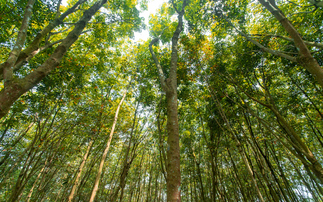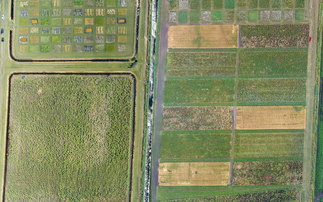EXCLUSIVE: Asda pledges to stop stocking certain canned products following investigation revealing links to illegal Amazon rainforest destruction
The global meat industry is once again under fire over its links to rainforest destruction, with a major investigation today revealing that beef supplied by companies linked to illegal deforestation in Brazil may have ended up on the shelves of several leading British supermarkets, and even in food products supplied to the NHS.
An investigation by the Bureau of Investigative Journalism, published today in partnership with BusinessGreen, has found that beef from farmers accused of illegal deforestation - and subsequently sanctioned with embargoes - was still making its way into global supply chains, including those serving at least two of the world's biggest meat companies, JBS and Marfrig.
JBS and Marfrig's UK customers include Sainsbury's, Asda, Lidl and other major supermarkets, as well as wholesalers, some of which supply the NHS.
The findings of the investigation - carried out in collaboration with Repórter Brasil - raise serious questions about the effectiveness and enforcement of Brazil's embargo system and undermine the 'deforestation-free' claims of multinational meat companies and their international customers.
Embargoes imposed by Brazil's environment agency are intended to penalise landowners and allow illegally cleared forest areas to recover. JBS and other major Brazilian meat producers have made commitments not to buy cattle from protected land.
But in one case involving a farmer doing business with the companies, multiple fires were recorded on land that had been embargoed after earlier deforestation, and the investigation tracked cattle supplied by the farmer implicated in this deforestation to abattoirs run by JBS and Marfrig.
The links between meat consumption, deforestation and the climate crisis have increasingly fallen under the spotlight in recent years. Meat and dairy account for around 14.5 per cent of global greenhouse gas emissions, according to the UN's Food and Agricultural Organisation (FAO), with growing demand for beef in particular swallowing up land - sometimes illegally - for grazing and cultivating soy for cattle feed, and often at the expense of tropical forest.
Sometimes described as the 'lungs of the planet', the Amazon is one of the most biodiverse regions on Earth and is also a major store of carbon, which is released into the atmosphere when the rainforest is burned, further exacerbating climate change.
Elena Polisano, senior forests campaigner at Greenpeace UK, said it was "inexcusable" for Britain's public services and supermarkets to be sourcing meat from companies involved in the desctruction of the Amazon. She called for JBS and other firms in the meat sector linked to deforestation to be excluded from UK supply chains "without delay".
"The Amazon rainforest is a crucial resource in our fight against the climate crisis but scientific evidence showing the extent of its destruction and impending collapse is truly horrifying," she said. "The only way we will prevent future climate catastrophe is with fast, decisive action including a zero tolerance approach to deforestation full stop."
In a bid to help combat the problem, the UK government is drawing up rules to ban businesses from selling items which use raw materials linked to illegal deforestation abroad, although campaigners have argued the ban should include all deforestation, whether or not it is deemed illegal under local rules.
A raft of UK supermarkets and retailers have also threatened to boycott products from Brazil over a law proposed in Brazil's parliament that environmental campaigners claim could authorise yet further destruction of the rainforest.
But today's investigation once again underscores the complex and often murky nature of global meat supply chains, and the major challenges companies face in stamping out links to deforestation in the products they buy and sell.
In response to the Bureau's investigation, Asda said it would stop stocking JBS Brazilian beef in its "newly sourced" canned goods.
"We have worked with our supplier to ensure that any newly sourced canned products do not contain any Brazilian beef from JBS by the end of 2021," an Asda spokesperson said, adding the business is committed to stopping food production linked to deforestation.
A Sainsbury's spokesperson, meanwhile, said the supermarket giant was "committed to sourcing sustainably and working together with Global Witness and the wider industry to tackle deforestation and preserve the essential ecosystems in the Amazon and Cerrado". Global Witness disputes this statement and says it has no working relationship with Sainsbury's.
Also responding to the investigation, the NHS said its food buying followed government standards for environmental protection, and that since last year it has asked for sustainability strategies from all suppliers for its procurements.
Lidl referred to a statement from the British Retail Consortium (BRC), the industry group of which it is a member. Andrew Opie, director of food and sustainability at the BRC said its members "take every effort to ensure the products they sell have no links to deforestation and work closely with their suppliers to check this".
Opie also stressed that companies "needed to be supported in their efforts by effective laws and enforcement to protect the forests from exploitation", as he criticised the recent bill under consideration in Brazil that he said could open up the Amazon to further exploitation. "The latest laws proposed by the Brazilian government could allow further deforestation that could accelerate the damage being done to the Amazon's fragile ecosystem," said Opie. "We urge the Brazilian government to withdraw the bill and take swift and concrete action to address the deforestation happening in its country."
Reign of fire
The burning of the Amazon has in particular has become a global political issue in recent years, with Brazil pledging to strengthen environmental enforcement under pressure from the US government.
It comes amid growing concerns over the South American rainforest, and today's investigation reveals that devastating fires on legally protected land in the Amazon have surged under Brazilian president Jair Bolsonaro.
Satellite mapping of blazes and data on unlawful deforestation analysed by the Bureau of Investigative Journalism show the number of major fires on embargoed rural land increased from 77 in 2018, immediately before Bolsonaro took office, to 124 in 2020.
Bolsonaro, who took office in 2019, has backed commercial exploitation of the world's largest rainforest.
Under his administration, Brazil's environment agency has issued fewer embargoes, sanctioning just 385 areas in the Amazon in 2020, compared with more than 2,500 in 2018. The area of land under embargo has remained roughly the same.
The number of fines issued for illegal burning and deforestation in the Amazon has plummeted, dropping from an average of 4,600 a year between 2012 and 2018 to 2,600 a year in 2019 and 2020.
Even before Bolsonaro came to power, fires on embargoed land were a problem. There were 243 major blazes in protected areas of the Amazon in 2015 - the worst recent year.
The number of such fires subsequently declined, but the destruction has now ramped up again. Experts fear this year's dry weather could increase the risk of severe blazes when the fire season peaks in August and September.
Meat suppliers under fire
The Bureau has established that Brazilian meat giants sourced hundreds of cattle from Vilymar Bissoni, a farmer linked to repeated cases of deforestation resulting in multiple embargoes in Mato Grosso state, a major centre for beef and soy production.
Records seen by the Bureau show that between them JBS and Marfrig bought nearly 1,000 cattle from Bissoni over 15 months in 2018 and 2019. Bissoni owns a company with a shareholding in the agribusiness Bissoni Agropecuária.
Bissoni Agropecuária and related companies run a sprawling network of farms in the municipality of Gaúcha do Norte, with more than 350 sq km of land producing soy and other crops and a beef enterprise with at least 7,000 cattle.
Bissoni and other family members connected with the business have been the subject of five environmental embargoes issued between 2009 and 2017, according to public records. At least three, spanning more than 26 sq km, were linked to illegal deforestation.
Unlawful clearing linked to the family business has also resulted in fines totalling more than $1m.
The investigation has established that at least three fires - in 2015, 2018 and 2020 - broke out within the perimeters of two of these embargoed areas, after the sanctions were imposed.
When approached for comment, Bissoni Agropecuária denied these were deliberately set.
Recent satellite images reveal how six square kilometres of forest was destroyed in the vicinity of another farm, Fazenda Vó Jovita, linked to Bissoni Agropecuária in September 2020. Fires were recorded at this property - which is not currently under embargo - in the same month.
The company said: "There was a fire in the indigenous land and in neighbouring areas. We were successful in fighting the fire before it entered our property."
Records seen by the Bureau reveal that cattle were repeatedly transported from Fazenda Vó Jovita to abattoirs supplying Marfrig and JBS between 2018 and 2019.
The Marfrig meat plant that slaughtered the Bissoni cattle had exported to the UK, highlighting how British consumption of Brazilian beef could inadvertently be helping to drive rainforest destruction thousands of miles away.
JBS did not deny doing business with Vilymar Bissoni but said Fazenda Vó Jovita did not correspond with any farm listed on its supplier system. The company said: "JBS does not tolerate any illegal deforestation in the Amazon or other biomes."
Marfrig confirmed that Bissoni had been a supplier to one of its slaughterhouses, but said the farmer was no longer on its supplier list. The company said the farmer was "fully compliant" with its rules for suppliers at the time of the transactions.
The company said it was committed to zero deforestation in the Amazon biome by 2025 and had introduced a system for monitoring cattle suppliers to reduce the possibility of transferring cattle from "irregular" areas to areas that are in compliance.
Nevertheless, the revelations will further fuel concern about the global supply chain for meat products, its impacts on the planet's vital rainforests, and the power and willingness of business and policymakers to take robust action to stamp out destructive, often illegal practices.
Robin Willoughby, UK director at global green advocacy group Mighty Earth, warned that the links uncovered in today's investigation were "just the tip of the iceberg", as he urged UK retailers and wholesalers to ditch suppliers such as JBS.
"These supermarkets have tried engaging suppliers for years, but have very limited results to show for it," he said. "Unfortunately, after years of experience, it seems the only way to send a signal to companies that are destroying forests is to hit their bottom line."
He argued "the message to UK supermarkets is clear: stop doing business with forest destroyers in your supply chain", and said food retailers should instead start shifting their offerings towards plant-based and cultivated protein.
"The UK government should also follow suit with a robust deforestation due diligence bill which tackles all forms of destructive deforestation, rather than one that is riddled with loopholes for purportedly 'legal deforestation'," he added.
Note: This story was updated on 6 August 2021 to reflect Global Witness's denial of working with Sainsbury's.
This story was published in partnership with the Bureau of Investigative Journalism.








